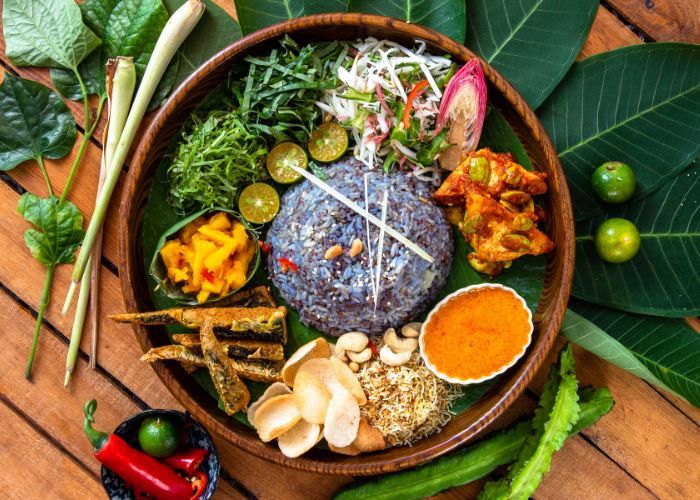Vegans and vegetarians are people who choose not to consume meat. But what is the essential difference between a vegan and a vegetarian? This you can read in this article on"mybiopedia.com".
However, veganism is a stricter diet and also prohibits dairy, eggs, honey and any other products that are of animal origin, including the use of leather and silk for clothing, shoes and accessories.
Both veganism and vegetarianism are becoming increasingly popular.
However, some people may find the differences between these two diets a little confusing, especially since there are several variations of vegetarianism.
In this article, we explore the similarities and differences between veganism and vegetarianism.
We will also discuss the health benefits of both diets, which diet is healthier, which is better for weight loss, and the risks and considerations to keep in mind if you decide to become vegan or vegetarian.
What is vegetarianism?
Vegetarians do not consume:
- meat, such as beef, pork and game
- poultry meat, such as chicken, turkey and duck
- fish and seafood
- insects
- rennet, gelatine and other types of animal protein
- broth or fat derived from the slaughter of animals

However, many vegetarians consume by-products that do not involve animal slaughter. These include: eggs dairy products such as fresh milk, cheese, cottage cheese, cottage cheese and yogurt honey
Vegetarians typically consume a range of fruits, vegetables, nuts, seeds, grains and pulses, as well as 'meat substitutes' and are rich in protein.
Vegetarianism is usually less strict than veganism, so there are several well-known variations of the vegetarian diet.
These include:
Lacto-ovo-vegetarian - People who follow this diet avoid all meat and fish, but consume dairy products and eggs.
Lacto-vegetarian - People on this diet do not eat meat, fish or eggs but do consume dairy products.
Ovo-vegetarian - People following this diet do not eat meat, fish or dairy products but do consume eggs.
Pescatarian - Those who follow this diet avoid all meats except fish and other types of seafood. However, this does not fit the traditional definition of vegetarianism and many people refer to the pescatarian diet as semi-vegetarian or flexitarian.
What is veganism?
Veganism is a stricter form of vegetarianism. Vegans avoid consuming or using animal products or by-products.

The Vegan Society defines veganism as "a way of life that seeks to exclude, as far as possible and practicable, all forms of exploitation and cruelty to animals for food, clothing or other purposes."
Vegans strictly avoid the consumption of foods or beverages that contain:
- Meat
- fish and seafood
- Eggs
- Dairy products
- Honey
- insects
- rennet, gelatine and other types of animal protein
- broth or fats which are of animal origin
Strict vegans also extend these principles beyond their diet and seek, whenever possible, to avoid any product that directly or indirectly involves the use of animals by humans.
These products may include:
- leather products
- wool
- silk
- beeswax
- soaps, candles and other products that contain animal fats
- latex products that contain casein, which is derived from milk proteins
- cosmetics or other products which manufacturers test on animals
What are the health benefits of vegetarianism and veganism?
Research shows that vegetarian and vegan diets can offer several health benefits.

A 2017 study examined the effectiveness of a plant-based diet in 49 overweight or obese adults who also had at least one of the following conditions:
- Type 2 diabetes
- coronary heart disease
- high blood pressure
- high cholesterol levels
At 6-month and 12-month follow-up, participants in the vegetarian/vegan diet group experienced significant reductions in body mass index (BMI) and cholesterol levels compared with those in the normal diet group.
A 2017 systematic review found evidence to suggest that plant-based diets may help lower total cholesterol, low-density lipoprotein (LDL) cholesterol, and high-density lipoprotein (HDL) cholesterol levels.
The researchers did not analyze how changes in cholesterol affected heart disease outcomes.
Another 2016 study found that vegetarians living in South Asia and the Americas were at lower risk of developing obesity than non-vegetarians.
A 2019 review cites evidence suggesting that plant-based diets may offer a range of cardiovascular benefits to athletes.
These benefits include:
- lower cholesterol levels
- improved blood pressure and blood flow
- better blood sugar control
- lower risk and prevention of atherosclerosis
- reduced oxidative stress and inflammation
Veganism or vegetarianism - which is healthier?
Both diets offer similar health benefits and generally encourage people to consume more wholesome foods rich in antioxidants and nutrients.
It is difficult to say which diet is healthier because both diets have advantages and disadvantages. For example, unlike vegans, lacto-vegetarians get calcium, phosphorus and vitamin D from dairy products.

However, avoiding dairy and eggs can help vegans keep their cholesterol levels low. Vegans are also at risk for a major deficiency of omega-3 fatty acids, particularly EPA and DHA, even if they consume plant sources of these nutrients.
DHA is necessary for brain function and memory, prevention of memory difficulties, etc. Vegetarians and pescatarians can get EPA and DHA more easily from eggs and seafood.
Doctors define a healthy vegan lifestyle as:
- eating a complete plant-based diet
- daily exercise
- drinking more than eight glasses of water a day
- regular exposure to sunlight
However, following a plant-based diet does not guarantee good health. Despite a stricter and more rigorous diet, it is still possible for vegetarians and vegans to lead an unhealthy lifestyle or eat processed food.
Which diet is better for weight loss?
A 2006 study of 21,966 participants and a 2014 review of three North American studies showed that vegans generally have a lower BMI than vegetarians and meat eaters.
A possible explanation for this trend is that vegans do not consume eggs or dairy products.
The 2006 study also found that vegans gained less weight than vegetarians and meat eaters over a 5-year period.

However, people who changed their diet to reduce their intake of animal products gained the least during the study.
Based on the data from these studies and surveys, we can conclude that the vegan way of eating is more suitable for people who want to get rid of excess weight.
Despite the efficacy of the vegan diet in losing weight and maintaining a healthy one, with a well-controlled vegetarian diet without processed foods, sugar and flour you can also reach great results.






Comments